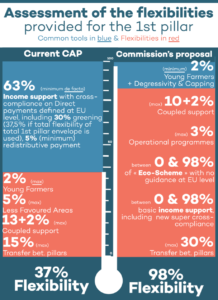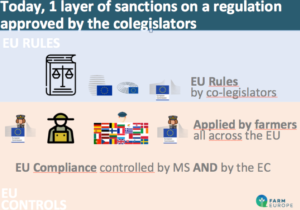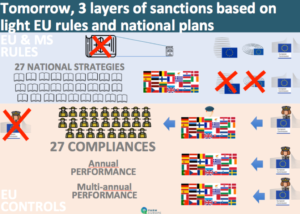Deforestation and EU imports of agri-food products
How can the EU avoid actually importing deforestation?
September 2019
The recent forest fires in the Amazon have put a renewed focus on the loss of forests at a global level, and on its connection to the EU’s international trading policy on importing various agri-food products that are linked to deforestation.
Since mid-July thousands of fires have been burning in the Amazon, destroying the habitat of the world’s largest rainforest. According to the Brazilian National Institute for Space Research (INPE), there were over 80 percent more forest fires than in the same period of the previous year. Images of the burning forests, smoke and a black sky over Sao Paulo have circulated the Internet resulting in increased public concern, culminating in an outcry from the international community. Several world leaders, such as UN Secretary-General António Guterres, the Pope and the G7 Summit, have joined NGOs in calling for a global commitment to more effectively and efficiently fight the fires.
The current fires in the Amazon renew attention to the loss of forests at global level.
If the loss of forests is not new, it has to be acknowledged that it now happens at an alarming rate. INPE’s latest preliminary data on the loss of trees in the Amazon show that an area of 1145 km2 – almost as big as Greater London – was cleared just in August, making it the highest level in the past five years. 1
In 1990 the world had 4 128 million ha of forest; in 2015 this area had decreased to 3 999 million ha2, and the latest FAO Report on the State of the World’s forests (2018) states that the “total area of the world’s forests is shrinking day by day”. During this period the largest forest area losses occurred in the tropics, particularly in South America, Africa and Indonesia.
| Forest/land area |
Forest area |
||||||
| UN Forest Cover | 2015 | 1990 | 2000 | 2005 | 2010 | 2015 | Change 1990-2015 |
| Country | % | (1000 ha) | (1000 ha) | (1000 ha) | (1000 ha) | (1000 ha) | (1000 ha) |
| Angola | 46.4 | 60976 | 59728 | 59104 | 58480 | 57856 | -3120 |
| Brazil | 59 | 546705 | 521274 | 506734 | 498458 | 493538 | -53167 |
| Cameroon | 39.8 | 24316 | 22116 | 21016 | 19916 | 18816 | -5500 |
| Colombia | 52.7 | 64417 | 61798 | 60201 | 58635 | 58502 | -5915 |
| Congo | 65.4 | 22726 | 22556 | 22471 | 22411 | 22334 | -392 |
| Côte d’Ivoire | 32.7 | 10222 | 10328 | 10405 | 10403 | 10401 | 179 |
| DRC | 67.3 | 160363 | 157249 | 155692 | 154135 | 152578 | – 7785 |
| Ecuador | 50.5 | 14631 | 13729 | 13335 | 12942 | 12548 | -2083 |
| Honduras | 41 | 8136 | 6392 | 5792 | 5192 | 4592 | -3544 |
| Indonesia | 53 | 118545 | 99409 | 97857 | 94432 | 91010 | -27535 |
| Malaysia | 67.6 | 22376 | 21591 | 20890 | 22124 | 22195 | -181 |
| Nigeria | 7.7 | 17234 | 13137 | 11089 | 9041 | 6993 | -10241 |
| Paraguay | 38.6 | 21157 | 19368 | 18475 | 16950 | 15323 | –5834 |
(Data from the UN FAO 2015 Forest Resources Assessment)
According to FAOSTAT, while in 1990, Brazil was 65,41% covered by forests, this dropped to 59,05% in 2015. The same dramatic trend can be seen in Indonesia as well: 65,44% in 1990 and 50,24% in 2015.
FAO’s 2015 Global Forest Resources Assessment shows that agriculture is expanding at the expense of forests in countries located in South America (e.g. Argentina, Brazil), South-East Asia (e.g. Indonesia, Malaysia, Thailand) and West & Central Africa.
The State of the World’s Forests 2018 concludes that “one of the great challenges of our times is the question on how to increase agricultural production and improve food security without reducing forest area.“ 3
Besides wildfires and illegal logging, the causes of deforestation – the conversion of forest to other land use or the long term reduction of the tree canopy cover below a minimum 10 percent threshold – are numerous and include the conversion of forests mainly for agricultural purposes, mining, infrastructure development and urban growth. Some of these conversions can even occur with the support of national authorities as for example most recently Brazilian President Jair Bolsonaro has defended the opening of indigenous lands for mining and threatened to pull Brazil out of the Paris Agreement.
These practices are global and can also be observed in Central Africa, which due to the Amazon fire coverage has gained more attention recently as satellite images show intense fires near the Congo Basin. 4
According to UNEP5, besides illegal logging and fires, widespread investments in palm oil plantations are the leading cause of rainforest destruction in South-East Asia. Indonesia and Malaysia are the world’s leading exporters of palm oil, with production skyrocketing. Based on FAOSTAT, the area under palm cultivation expanding by a factor of 7 times in Indonesia (from 1190000 ha to 8630000 ha) and almost doubled in Malaysia (from 2540087 ha to 4859397 ha) between 1995 and 2015. Greenpeace and Forum for Environment (Walhi) argue that due to its loopholes, Indonesia’s legal moratorium on converting primary natural forests and peatlands to palm and logging concessions has been ineffective. The European Commission’s Report on the status of production expansion of relevant food and feed crops worldwide (2019) states that palm oil is the highest ILUC-risk biofuel feedstock.6
Economic losses from weather and climate-related events already average EUR 12 billion per year in the EU (EUR 426 billion – at 2017 values – between 1980 and 2017)7, which is only set to increase in the future if no action is taken.
The EU is well aware of the situation and is committed to act against it. Just recently the European Commission has published its Communication “on stepping up EU Action to Protect and Restore the World’s Forests”, in which it calls for “a variety of regulatory and non-regulatory actions” and proposes a list of initial actions to reach its two-fold objective of protecting existing forests and increasing global forest coverage. In doing so, the Commission sets out five priorities, including reducing the EU consumption footprint on land and encouraging the consumption of products from deforestation-free supply chains.
Through its trade and consumption of various agri-food products, the EU causes deforestation. In its resolution on palm oil and deforestation of rainforests, the European Parliament noted that a little under one quarter (by value) of all agricultural commodities in international trade obtained from illegal deforestation is destined for the EU. 8 Such previously identified products coming from agriculture include palm oil, soy, rubber, beef, maize, cocoa and coffee. 9
The origin of the goods and services consumed in the EU27 that were associated with deforestation (between 1990-2008) point towards South America and South- East Asia. For Southeast Asia, palm oil is the main source of deforestation related to EU imports. For South America, this is primarily beef and soy.
This trade could be expanded under the proposed EU-Mercosur Trade Agreement. Experts have well described the vicious circle of the Amazonian forests being deforested due to illegal logging of a few high value trees and the burning of other low-value trees into charcoal sold to the iron and steel industries, with the land cleared being then used as pasture for beef production. In this disaster in the making for the climate and our planet, the share of deforestation attributable to farmers, including small farmers, whose production consolidates the overall supply of meat from Brazil and its ability to export, can’t be denied.
In the context of the proposed EU-Mercosur Trade Agreement the export of beef meat is planned to increase and additional beef production in the Amazon – even if only consumed in the domestic market – frees up more beef produced in Center and South Brazil for export too.
During the Commission’s publication of the Forest Communication, Commissioner Jyrki Katainen defended the Mercosur deal by stating that it requires Paris Agreement compliance and contains a “strong, robust sustainable development chapter, which gives the EU a stronger hand to have a political dialogue on sustainability related issues”. Hence he insisted that the deal gives the EU more influence in preventing deforestation in Brazil.
The Trade and sustainable development (TSD) chapter 10 of the agreement includes indeed Articles on biodiversity, environment and climate, which state that each Party shall effectively implement the Paris Agreement, which both blocs signed. Nevertheless there are today no further concrete instructions or control/reporting mechanisms on the ‘how’ part within the Agreement. The Paris Agreement includes a pledge to stop illegal deforestation in the Amazon by 2030, but the opposite is happening.
Due to their importance to the Earth’s ecosystem, rainforests like the Amazon, Borneo or the Congo Basin are a universal common good and concern of all humanity and should be preserved accordingly. 11
Accordingly, if the EU wishes to be a world leader in fighting climate change it must do more.
One way is to explicitly declare and follow-up its ‘zero-deforestation’ policy and commit to a ‘zero-deforestation’ supply chain. For that, it needs to find a way to:
- value the preservation of rainforests more than the products that originate from its destruction.
- stop imports of goods linked with deforestation, and put efficient safeguard mechanisms to be activated at any time by the EU on the basis of objective data and reports that the EU should revisit every 6 months.
Both for its imports of biofuels and feedstocks used for biofuel production in the EU and for imports of agricultural and food products from areas at risk of deforestation, the European Union should either build a robust system of deforestation free import certification or an efficient system of verification of deforestation free export certificates made by exporting countries. Such certifications would be the first sine qua non for authorization of entry of these products into the territory of the European Union.
On top of that publicly accessible data on the matter at hand would make sense and put Europe in a perspective of co-construction and search for solutions as it could help to prevent the start of deforestation of intact forests and contribute to work together in order to develop “local” regional strategies.
Proposal for specific conditions for an efficient and trustworthy EU deforestation certification scheme (safeguard clause):
Every 6 months, the European Commission should present a report covering the trends related to deforestation and the expansion of deforestation risk related products into high carbon stock areas including forests and peatlands. The European Commission should be empowered to trigger a safeguard clause allowing the European Union to suspend the deforestation free certificates in regions or countries, where deforestation is observed. The safeguard clause should be applied at an appropriate geographic level in order to cover indirect effects and potential market transfers.
This would mean that products in zones that have proven on-going deforestation (‘red zones’) should then be blacklisted and EU customs should block the imports from those regions/products. In order to be consistent with the principle that the EU shall not make any compromises on the issue of deforestation no exemptions shall be given to such products. This would require an improved system of information and transparency.
For proving such practices field inspections would be almost impossible to carry out. Therefore the unbiased monitoring of forest cover change through satellite imagery seems to be the most appropriate methodology to follow deforestation, degradation and the state of the forests. Such technologies have been developed by European enterprises such as Copernicus or Starling, used in particular by companies as part of their Zero Deforestation commitments.
The EU could accept, and even support, equivalent systems to monitor deforestation implemented by the concerned countries, if those are also based on objective and verifiable satellite imagery and open to auditing. This would represent a welcome step towards empowering countries where deforestation has been a plague to take the matter on their hands and implement the appropriate mix of control, economic, social and environmental policies to halt deforestation and forest degradation. In this context the EU could also support measures that aim at increasing agriculture productivity, which would ultimately reduce the economic and social pressure to deforestation and use of peatlands.
The EU needs to step up its game to turn words into concrete actions with effectively working measures – starting by stopping the importation of deforestation sourced products – if it wishes to honour its pledge to halt deforestation by 2020 as stated in the New York Declaration on Forests12 and the UN Sustainable Development Goals (Goal Number 15.2).
1 http://terrabrasilis.dpi.inpe.br/app/dashboard/alerts/legal/amazon/aggregated/
2 FAO Global Forest Resources Assessment 2015
3The State of the World’s Forests 2018 – Forest pathways to sustainable development. FAO (2018)
http://www.fao.org/3/I9535EN/i9535en.pdf
4https://firms.modaps.eosdis.nasa.gov/map/
5 “The Last Stand of the Orangutan- State of Emergency: Illegal Logging, Fire and Palm Oil in Indonesia’s National Parks http://wedocs.unep.org/xmlui/bitstream/handle/20.500.11822/7524/- The%20Last%20Stand%20of%20the%20Orangutan- %20%20State%20of%20Emergency_%20Illegal%20Logging%2c%20Fire%20and%20Palm%20Oil%2 0in%20Indonesia%27s%20National%20Parks-2007756.pdf?sequence=2&isAllowed=y
6European Commission: Report on the on the status of production expansion of relevant food and feed crops worldwide (2019) https://ec.europa.eu/energy/sites/ener/files/documents/report.pdf
7https://www.eea.europa.eu/data-and-maps/indicators/direct-losses-from-weather-disasters- 3/assessment-2
8 http://www.europarl.europa.eu/doceo/document/TA-8-2017-0098_EN.pdf
9 Feasibility study on options to step up EU action against deforestationhttps://ec.europa.eu/environment/forests/pdf/KH0418199ENN2.pdf
10 EU-Mercosur Agreement – Trade and sustainable development chapter
https://trade.ec.europa.eu/doclib/docs/2019/july/tradoc_158166.%20Trade%20and%20Sustainable%2 0Development.pdf
11http://www.fao.org/3/I9535EN/i9535en.pdf
12 https://www.undp.org/content/dam/undp/library/Environment%20and%20Energy/Forests/New%20Yo rk%20Declaration%20on%20Forests_DAA.pdf


